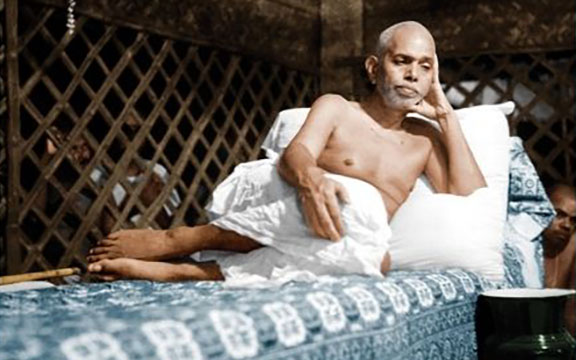
Photo: Sri Ramana Maharshi
I know it sounds hard, but we must remember that when we go through, or see, suffering it is not the Immortal Self that suffers. Who is the sufferer then? It is the mind that goes through all the changes—the little ego, guided by vasanas, wrong thinking, and conditioning that tries to veil the real Self.
It is difficult, but let us remember that it is not our essence—our true identity—that undergoes anguish and pain. Even realized beings (jivanmuktas) will have to live out their bodily karma until they are liberated from the body. That is why we have seen great saints like Sri Ramakrishna and Sri Ramana Maharshi going through illnesses like cancer.
Often I am asked, “Why should such great souls have such horrid diseases? They even appear to have suffered.” The answer is that as the Self, they never had cancer. Their bodies were diseased, their minds experienced profound pain, and yet they themselves were watching—identified not with the body or mind, but with the Self. I saw it myself when I had the great privilege to be with Bhagavan Ramana Maharshi before he left his body. I could barely stand the sight of what his body was going through, yet he smiled and teased me and the others as if we were fools. “What kind of Yoga is this, eh?” he would ask. “Why do you worry so? This body is just undergoing its karma.”
Some of Sri Ramana’s devotees pleaded with him to heal his body. They went to him, crying and asking, “Bhagavan, we have seen you heal others, can’t you please put your hand on your own body and heal this cancer, at least for our sake? Just touch the affected portion of the body, please Bhagavan, you will get healed.” He gazed at them with compassion, knowing that their great devotion to him prompted these pleas. Then, he gently replied, Who is the one there who should heal it?” The devotees were silent. They again were reminded that Bhagavan didn’t identify with the body-mind; there was no longer any “doer” to do anything since that seeming separate self had dissolved long before. Bhagavan was established in his true identity (the Self) and was imparting atma jnana (the wisdom of the Self) to them even during this dire situation.
Bhagavan continually abided in that awareness. Occasionally he would cry out in pain and then he would smile, “Ah, the poor mind can’t bear it. Poor mind, poor body, it seems to you a heavy burden, eh?” He even underwent a cancer operation without any sedatives—a cancer operation! The doctors said it would be impossible without anesthesia. But Bhagavan steadfastly refused. “No. Just do it.” As they were removing the cancer he commented, “Poor arm, tsk, tsk, tsk . . . I told them not to operate on you but they insisted. Okay. So now you must be strong and accept it.” He spoke with profound compassion, as if he were consoling somebody else. And really he was talking to his own body, telling this to his own mind. Because he knew that before the cancer, during the cancer, and after the cancer he would still be the Self. He had attained this God-conscious state and he rested in that peace. That is the true freedom from any and all suffering.
For myself, I could no longer stand the sight of it. I wept and told him so; I told him that I wanted to go. A short time before he left the body, I took leave of him. And he understood; he just nodded his head. I went straight to Rishikesh and the day I arrived the radio brought the news that Sri Ramana Maharshi had left the body.
Sri Ramana witnessed the mental and physical feelings, resting secure in the knowledge that everything in this world must pass away. Through atma jnana which is cultivated by detachment and the constant questioning of “Who am I?,” we can realize this God-conscious state too. It is our own true, essential, and abiding nature.
Ask yourself continually: Who is the one having this hunger? Who is this who is feeling thirsty? Who is this who feels unhappy? Am I always this way? No? I seem to go through these moods, thoughts, feelings, wants. I experience them. They come and go, yet “I” remain. So, I am not the changing phenomena but rather the unchanging Self. This process of questioning and the letting go of every bit of identification with the ever-changing is a path toward realizing the true Self.

